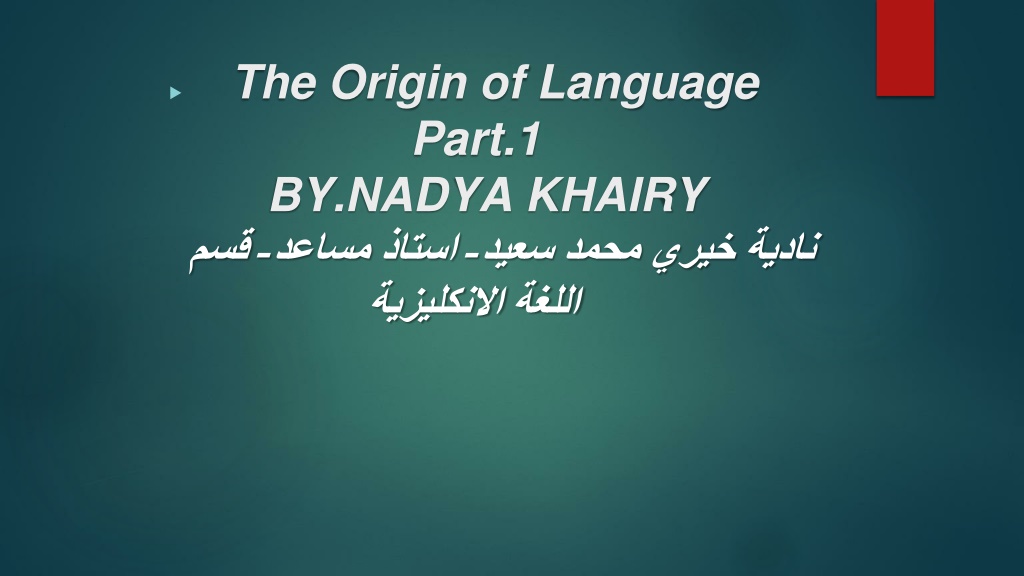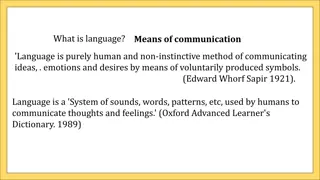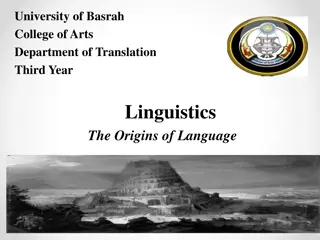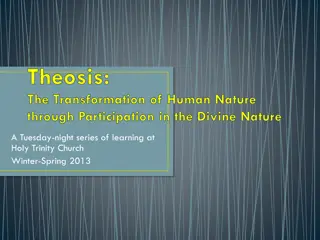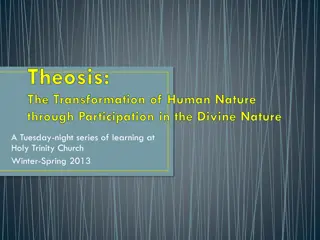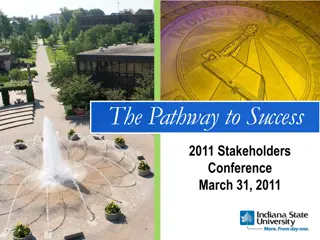Exploring the Origins of Language: Divine, Natural, and Experiential Sources
Delve into the fascinating exploration of the origins of language, examining theories including divine origins as gifts from gods, natural sound sources through onomatopoeia, genetic influences, and experimental attempts to uncover language's beginnings. Discover intriguing insights into the diverse sources that may have contributed to the development of human language.
Download Presentation

Please find below an Image/Link to download the presentation.
The content on the website is provided AS IS for your information and personal use only. It may not be sold, licensed, or shared on other websites without obtaining consent from the author. Download presentation by click this link. If you encounter any issues during the download, it is possible that the publisher has removed the file from their server.
E N D
Presentation Transcript
The Origin of Language Part.1 BY.NADYA KHAIRY - -
The Sources of Language: 1-The Divine Source 2-The Natural Sound Source 3-The Social interaction Source 4-The Physical Adaptation Source - Teeth, Lips, Mouth, Larynx and Pharynx 5-The Tool-Making Source 6-The Genetic Source
1-The Divine Source: In most religions Language is considered a gift from the gods to human beings. As documented in the biblical tradition, described by the book of Genesis, God created Adam and whatsoever Adam called every living creature. Alternatively, following the Hindu tradition, Language came from Sarasvati wife of Brahma, creator of the universe. ( Lyons , 1981 , The Study of Language )
Experiments Carried out to discover the Origin of language: 1- Herodotus reported an experiment by a Pharaoh named Pasmtik where two children who grew up in the company of goats and a mute shepherd, were reported to have spontaneously uttered a Phrygian word BEKOS , meaning BREAD . 2-Another experiment was done by King James The Fourth of Scotland, he expected that children who grew up in isolation were reported to have spontaneously started speaking Hebrew confirming The King s belief that Hebrew had indeed been the language of the Garden of Eden. However these experiments were created with dissimilar results which leads us to the conclusion that they were false.
2-The natural sound source: The Basic idea is that primitive words could have been imitations of the natural sounds that early men and women heard around them, when an object flew by making for example caw-caw sound, the early human tried to imitate the sound and used it to refer to the thing associated with the sound. This type of view has also been called the BOW-WOW THEORY of language origin. Onomatopoeia: words that sound similar to the noises they describe, while its true that a number of words in any language are Onomatopoeic, it is hard to see that most of the soundless things and abstract concepts in our world could have been referred to in our language that simply echoed natural sounds.
The original sounds may have also come from Natural cries of emotion: Natural cries of Emotion such as pain, anger and joy might have been the source of natural sounds. By this route presumably, Ouch! Ouch came to have its painful connotations. And other interjections such as AH!, Ooh!, Wow!, Yuck! Are all produced with a sudden in take of breath. The expressive noises that people make in emotional reactions contain sounds that are not otherwise used in speech production and consequently would seem to be rather unlikely candidates as source sounds for language.
3-The Social Interaction Source: Another proposal involving the natural sounds has been called the yo-he-ho theory. The idea is that the sounds of a person involved in a physical effort could be the source of our language, especially when physical effort involves a group of people and the interaction between them had to be coordinated.
So a group of early humans might develop a set of hums, grunts, groans and curses that were used when they were lifting and carrying large bits of trees or lifeless hairy mammoths. The appeal of the yo-he-ho theory is that it places the development of human language in a social context, early humans must have lived in groups, if only because larger groups offered better protection from attacks. And finally, we conclude that this theory doesn't answer our question regarding the origins of the sounds produced, apes and other primitives live in social groups and use grunts and social calls, but they don t seem to have developed the capacity for speech.
